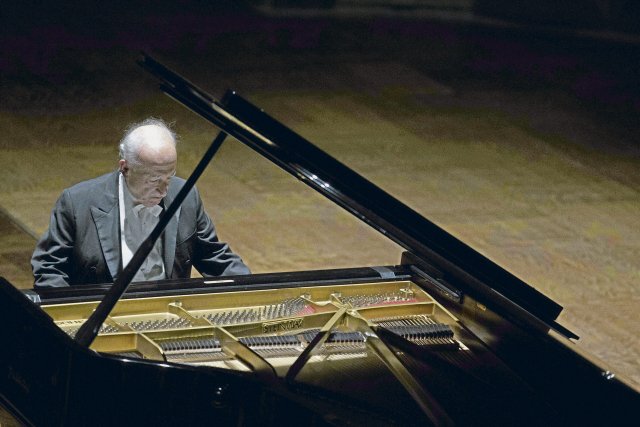An outstanding performer who combined intellectuality with emotional sensitivity: Maurizio Pollini, 2016
Photo: imago/Xinhua
It was in the 70s. The teenager learned one or two works by Frédéric Chopin and gave himself over to romantic sounds and feelings – “I feel so romantic”… – as a counterpoint to a world that he didn’t really get along with and which he learned to reject.
And then my friend, the daughter of a Munich music professor, came along with this record: Maurizio Pollini played the two cycles of the Chopin études op. 10 and op. 25. And a new world opened up: brilliant virtuosity. But above all: structural clarity, a certain coolness, no rubato bath, but transparent sound images and intellectuality. It was a “modern” Chopin in the best sense of the word who could be heard here. Unique.
This recording from 1972 remains groundbreaking to this day. The stringent C major sea of the first etude or the serenity of the sparkling second, chromatic one are breathtaking. And in the more “sentimental” etudes, for example the melodious third or sixth, Pollini refrains from any exaggeration and creates intense, true feelings precisely through this not letting himself go. While in the A major etude he conjures up an almost exhilarating vision of beauty.
Perhaps it is precisely the examination of the works of classical modernism and contemporary, current music that drove Pollini to different interpretations of Chopin, but also of Schubert or Beethoven: intellectuality, coupled with emotional sensitivity. To speak with hacks: classic beauty.
Concert promoters who wanted to book Pollini with Chopin or Beethoven had to accept his mixed programs, including works by Schönberg, Stockhausen and Webern. His recordings, for example, of Webern’s Variations op. 27, Boulez’s Second Sonata, Alban Berg’s Piano Sonata and the first recording of Nono’s “Como una ola de fuerza y luz”/”… sofferte onde serene…” are milestones. And the way he sweeps through Bartók’s piano concertos or Stravinsky’s “Petrushka” suite remains unique.
In 1960, at the age of just 18, Maurizio Pollini won first prize at the International Chopin Competition in Warsaw, the most important pianist competition of all. The legendary Artur Rubinstein, head of the jury at the time, was enthusiastic: “This boy plays the piano better than any of us.”
Of course, that was a perfect start to a world career. But Pollini withdrew again and again in the 1960s, meditated, studied (including with Arturo Benedetti Michelangeli), and he occupied himself with politics. Scandal made an appearance in Milan in 1972, where he read a note of protest against the bombing of North Vietnam by the US military before the concert. Together with the composer Luigi Nono and the conductor Claudio Abbado, Pollini campaigned against dictatorships in South America and for workers’ rights; and together with Abbado he later fought against the cultural overexploitation by the Berlusconi government.
But Pollini (like Nono and Abbado) did not just pay lip service. In the 1970s, Pollini often performed solo or with artist friends in factories, left-wing cultural centers, sports halls, in villages or at concert projects for the underprivileged. He sympathized with the left-wing revolt in Italy, with Enrico Berlinguer’s Eurocommunism and advocated cultural participation for all levels of society.
But unlike so many who want to forget their political involvement as a kind of youthful sin, Maurizio Pollini remained a political artist to the end, as was shown in an interview with Bayerischer Rundfunk on his 75th birthday: »I can very well imagine that once again there will come a time when I feel compelled to say certain things to the audience at a concert. But this can only ever be an exception, a last chance to fight against developments that are intolerable.
In recent years he has again intensively dealt with Beethoven’s piano sonatas and re-recorded the Hammerklavier Sonata op. 106, a prime example of analytical clarity and penetration of the complicated architecture of this work. Sensitivity and emotionality are by no means neglected. On the question of understanding music, Pollini confessed in the interview: “I think all we know is this: there is a wealth, an abundance of feelings.”
Maurizio Pollini, a figure of the century, died on Saturday at the age of 82. And everyone who cares about piano music is protesting his death.
Become a member of the nd.Genossenschaft!

Since January 1, 2022, the »nd« will be published as an independent left-wing newspaper owned by the staff and readers. Be there and support media diversity and visible left-wing positions as a cooperative member. Fill out the membership form now.
More information on www.dasnd.de/genossenschaft
demo slot x500 demo slot x500 judi bola online sbobet
